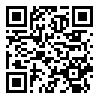Volume 2, Issue 3 (12-2021)
2021, 2(3): 124-143 |
Back to browse issues page
Download citation:
BibTeX | RIS | EndNote | Medlars | ProCite | Reference Manager | RefWorks
Send citation to:



BibTeX | RIS | EndNote | Medlars | ProCite | Reference Manager | RefWorks
Send citation to:
Heydarian M, Mirzaii M, Shah-Oveysi S, Akbari M. (2021). Effectiveness of Cognitive-Behavioral Play Therapy on Behavioral Problems, Responsibility and Self-esteem of Male Students with Attention Deficit Hyperactivity Disorder. Journal of Childhood Health and Education. 2(3), 124-143.
URL: http://jeche.ir/article-1-54-en.html
URL: http://jeche.ir/article-1-54-en.html
Abstract: (3395 Views)
Introduction: As it's vivid by the name of cognitive-behavioral play therapy that cognitive-behavioral interventions are put in a play program in order to solve children's behavioral problems. As you know play-like activities and also verbal and nonverbal communications have been used widely to solve behavioral problems of children. The purpose of this study was to determine the effectiveness of cognitive-behavioral play therapy on behavioral problems, responsibility and self-esteem of male students in 5th and 6th elementary grades in Javanrood city with attention deficit hyperactivity disorders Research Method: The statistical population of this study consisted of all male students in fifth and sixth elementary grades in Javanrood city in the academic year of 2019-2020. The method of this research was semi-experimental. This research was a purposeful applied study. The sampling method was an available sampling method, in which two groups were randomly selected: control and intervention. The data were collected by pre-tests post-tests of two control and intervention groups from which 15 students were randomly assigned to each group (total number was 30 students). The intervention group received 10 sessions of cognitive behavioral play therapy. In this research, three questionnaires had been filled by both groups. The questionnaires included the five-scale self-esteem test of Pep et. al (1989) for children, the Rutter behavioral problems questionnaire (1967), and the Munir Kordloo responsibility questionnaire (2014). The data were analyzed by Multivariate Covariance Analysis (MANCOVA) and the statistical analysis was performed by SPSS software version 22. Results: According to obtained results from this study it could be acclaimed that the cognitive-behavioral play therapy has significantly affected on behavioral problems, and changed the level of self-esteem and responsibility of students. Discussion: According to the effectiveness of cognitive-behavioral play therapy on behavioral problems, responsibility and self-esteem of students with attention deficit hyperactivity disorder and making significant changes on them, this treatment method can be used as an intervention model to recover the symptoms of attention deficit hyperactivity disorder in children along with medical treatment and other rehabilitative procedures.
Keywords: Cognitive-Behavioral Play Therapy, Attention Deficit Hyperactivity
Disorder, Behavioral Problems, Responsibility, Self-esteem, Students
Type of Study: Research |
Subject:
General
Received: 2021/12/8 | Accepted: 2021/12/16 | Published: 2021/12/31
Received: 2021/12/8 | Accepted: 2021/12/16 | Published: 2021/12/31
| Rights and permissions | |
 |
This work is licensed under a Creative Commons Attribution-NonCommercial 4.0 International License. |


